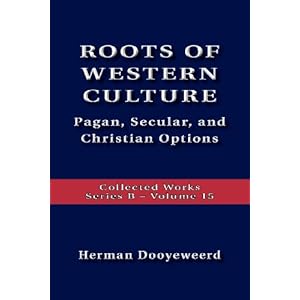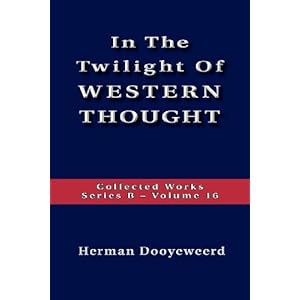Paideia Press have recently reissued three key works by Dooyeweerd - and each one is under £10.
The Roots of Western Culture
This work is a must-have item for both the general Christian community and students and teachers alike. Teachers will find the book a excellent entrée to Dooyeweerd’s broad historical and systematic vision, and a work that can be assigned for student use in introductory classes. Written as a series of articles for a weekly newspaper in The Netherlands, it is Dooyeweerd’s attempt to provide “renewed reflection on the meaning and scope of the religious ground-motives that have controlled our western culture in its historical development.”
In the Twilight of Western Thought
The publication of Twilight in this PAIDEIA edition will finally provide easy access to the essential systematics of Dooyeweerd’s position.
Based upon a lecture series given by Dooyeweerd in North America during the late nineteen-fifties, this work was prepared in English by Dooyeweerd himself and first appeared in 1960, published by The Presbyterian and Reformed Publishing Company, Philadelphia, Pennsylvania. It was reprinted in 1968 by The Craig Press, Nutley, New Jersey. This latest edition contains some significant new features that have been added by the editor. “For instance, the text has been divided into four main parts and, with the exception of chapter eight, all other chapter headings have been revised or added by the editor. They are intended to more accurately indicate the development of the argument and to break up the text into more manageable sections, particularly for use in teaching.” (From the editors remarks)
The Struggle for a Christian Politics
This early study (1924-27) reveals the depth and scope of Dooyeweerd’s emerging philosophy. The historical topics covered include Early Christianity and the birth of the idea of the Corpus Christianum; the unitary ecclesiastical culture of the Middle Ages and its dissolution; the emergence of modern Humanism in the Renaissance; and the rise and self-destruction of the Humanist theories of natural law. The attention that Dooyeweerd pays to the development of the modern concept of science and the new concept of matter may appear a needless digression yet paves the way for his probing analysis of the mathematical method prevalent in the views of political theorists like Grotius and Hobbes. (From the Foreword)
Subscribe to:
Post Comments (Atom)




No comments:
Post a Comment